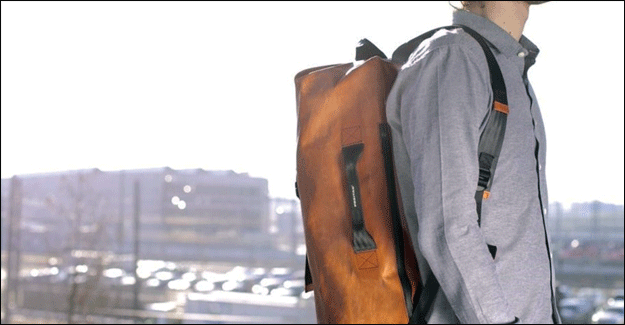
Freitag Bag Brand Upcycles Tarpaulins And Seat Belts For Sustainability
Brothers Daniel and Markus Freitag are on a mission to reshape fashion. Their company upcycles 460 tonnes of tarpaulins, 130,000 seat belts and 12,000 bicycle inner tubes a year
Any fashion label looking to incorporate sustainability into its business could learn from Swiss brand Freitag. While it's known for its iconic messenger bags that are loved by cyclists around the world, its philosophy goes much deeper than just creating functional fashion.
Freitag isn't a new kid on the sustainable fashion block. It was founded in 1993, way before going eco was chic, by brothers Daniel and Markus Freitag. The duo grew up in a farmhouse where they tinkered with spare parts and scraps, transforming them into something new (in current fashion speak, this technique would be referred to as "upcycling").
"When we were 16, we travelled to India and became fascinated by how little they wasted. We didn't know what the word sustainability even meant back then, but it was amazing to see how they created things with so little resources and simple tools. We recognised something very beautiful in what they were doing," says Daniel, who was recently in Hong Kong.
Markus came up with the idea of using discarded truck tarps to make their bags after watching the vehicles go by his flat window in Zurich. He took the waterproof fabric and fashioned it into their bestselling Top Cat F13, a courier bag for cyclists that fit papers ranging from A3 to A2 in size - "no one carried laptops in those days, just paper folios," he laughs.
Since then, the brothers have expanded the range to more than 80 models, such as smartphone and laptop sleeves, backpacks, handbags and travel bags. While each style has been developed based on their own personal needs, every product is made from recycled textiles, which have now expanded beyond tarps to include seat belts and bicycle inner tubes. The company says it uses 460 tonnes of truck tarpaulins, 130,000 car seat belts and 12,000 bicycle inner tubes per year.
"Our design process focuses more on everyday problems we want to solve versus the customer we want to sell to. Because of this, it usually takes a minimum of a year to develop a product. Sourcing the material has also been a challenge. We never know the amount, price or colour we are going to get, but that results in a unique product. Our production is still done in Switzerland, which isn't cheap, so there isn't a big margin either," says Markus.
To find a solution to the unpredictability, the brothers have developed a biodegradable textile called F-Abric four years ago, based on fibres including hemp and flax that are produced using the minimum resources. This was used to create a garment collection inspired by the company's staff.
"It was a great experience to move into a new field of material. We're still thinking of how to give materials a second life, but this time we actually created the first life, so it was exciting to develop material that could exist in a continuous cycle," says Daniel.
Initiatives such as these have created a loyal customer base, who have gravitated towards the brand's values of sustainability and authenticity. Rather than demand a new product each season - Freitag does one-off collaborations instead of seasonal collections - they come for a product that is high quality and built to last.
This has enabled the brand to think out of the box and launch fun initiatives such as "Gone with Freitag" which happens once every year. Customers are invited to "rent" bags for their summer holiday free of charge, which they can then share on social media using a special hashtag.
"When it comes to sustainability you really need to make it part of the company's core guidelines and its culture. It needs to be built into the product from the beginning. It's not something you write on an Excel sheet and that everyone follows. Honesty and transparency among your staff, and with your customer, is also vital," says Markus.
Looking ahead, the brothers are idealistic about their long-term contribution to the industry. In addition to developing more "meaningful" products they have a bigger goal: to help inspire more people to be accountable for the products they consume and how they use them.
"We want to inspire more similar projects in other countries. If we had the same impact in China as we have had in Switzerland, and everyone knew the Freitag story and were somehow inspired to do something similar, imagine how much good that could do? It's not a question of how many truck tarps we recycle. Products that look good are great, but we want people to ask about the story behind the products and how they are made, and understand the ideas behind our thinking. Once they understand the issues we can start more conversations and make a change," says Daniel.
Textile Excellence
If you wish to Subscribe to Textile Excellence Print Edition, kindly fill in the below form and we shall get back to you with details.












